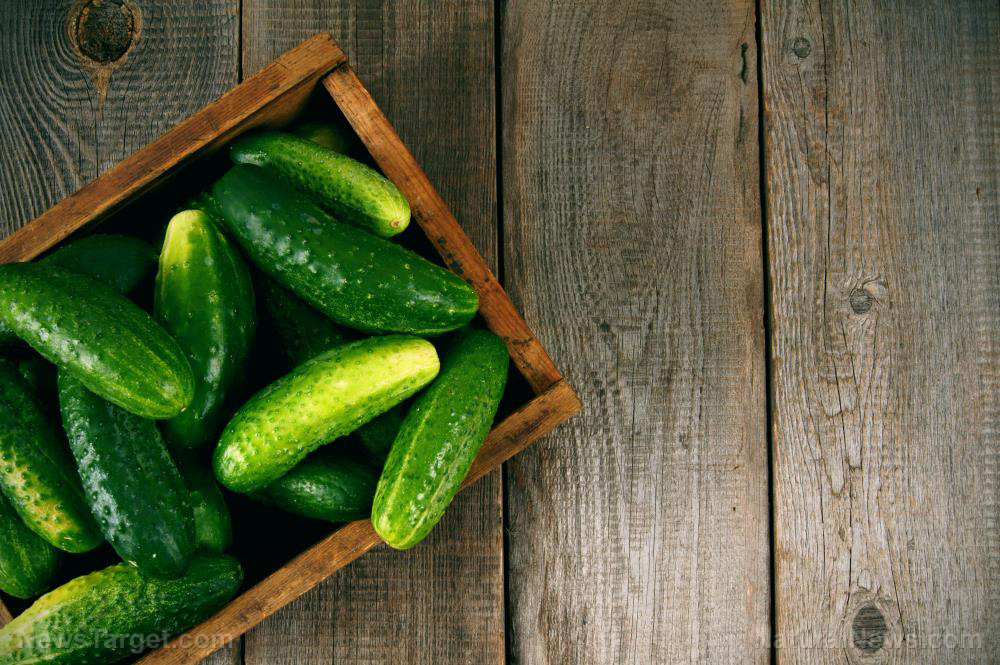
Advertisement
Cucumbers don’t get enough credit. Many people seem to think that this particular gourd, unlike melons and pumpkins, has very low nutritional value. This isn’t necessarily true, even though cucumbers are, in fact, 96 percent water. This crunchy, refreshing vegetable offers more amazing health benefits than you might think. (h/t to Healthline.com)
Regulates body temperature
Staying hydrated, especially in hot weather, is essential for maintaining a healthy, functioning body. Many people meet their daily fluid intake requirement by simply drinking water, but some people also turn to fruits and veggies with high water content to supplement their water intake. Some examples of these foods are cucumbers, tomatoes, spinach, broccoli, Brussels sprouts and oranges. When you consume foods with high water content, you help your body stay hydrated longer. Plus, eating these foods can also help regulate your body temperature so you can avoid dizziness, fainting spells and heat stroke.
Additionally, staying hydrated helps prevent toxins from lingering inside the body. Cucumber also acts as a diuretic, which encourages the body to urinate more frequently. In turn, this flushes out toxins in your system and prevents them from lingering inside your kidney or urinary tract where they can cause problems.
Nourishes the skin
Cucumber contains powerful antioxidants that help protect the body from disease-causing free radicals. This, together with its high water content, makes cucumber an effective natural skincare treatment. One of the most popular ways people use cucumbers for skincare is by placing cucumber slices on the eyes to reduce puffiness and the appearance of dark circles. You can also apply cucumber slices directly onto the skin to reduce swelling, irritation and sunburn. Additionally, people with acne-prone skin have also used cucumbers to create natural face masks that help soothe irritated, acne-ridden skin.
Lowers risk of metabolic syndrome
Metabolic syndrome is a cluster of risk factors that increase your risk of Type 2 diabetes, heart disease and stroke. Some of these risk factors include high blood sugar levels, high blood pressure and high levels of bad cholesterol. To avoid metabolic disorders and cardiovascular disease, it is important to address risk factors as soon as they are detected. Luckily, regularly consuming cucumber has been shown to contribute to maintaining healthy levels of sugar, blood pressure and cholesterol in the body. Staying physically fit and eating a balanced diet rich in nutrients can go a long way towards significantly lowering your risk of metabolic syndrome.
Interestingly, eating cucumber has been shown to have a significant effect in curbing particular symptoms of metabolic syndrome. Cucumber contains high levels of the bitter-tasting nutrient cucurbitacin, which is a natural plant compound found in pumpkins and gourds. Healthcare professionals believe that the cucurbitacins in cucumber help regulate insulin and metabolism in order to control blood sugar levels. Moreover, cucumber also contains sterols, a type of lipid found in plants, which help reduce cholesterol levels. Eating cucumber can also prevent blood pressure from rising past normal levels thanks to cucumber’s high potassium content.
Relieves arthritis pain
Gout is a type of arthritis that occurs when there is too much uric acid in the bloodstream. Often, this results in the buildup of uric acid crystals in the joints, causing immense pain for the individual. If symptoms of gout are detected early, drinking plenty of water should be enough to help the body flush out excess uric acid. However, it can be difficult to alleviate joint pain when there is already too much uric acid buildup. Luckily, cucumber can help relieve painful, swollen joints, thanks to the cucurbitacin’s anti-inflammatory properties.
The cucumber is a highly versatile vegetable with many potential health benefits to offer. Try to include it in your diet – raw, pickled or cooked.
Sources:
Advertisements







